Glucose
Glucose is a simple sugar and the most important carbohydrate in biology. It is the primary source of energy for the body's cells and is often referred to as blood sugar. Glucose is a crucial component in the process of cellular respiration, where it is broken down to release energy.
Structure of Glucose
Glucose is a hexose sugar, meaning it is composed of six carbon atoms. Its chemical formula is C6H12O6. Glucose molecules can exist in two forms - a linear form and a cyclic form. The cyclic form is more stable and is the predominant structure in aqueous solutions.
Role in the Body
Glucose is transported in the bloodstream and is used by cells for energy production. It is particularly important for the brain and red blood cells, which rely solely on glucose for energy. Excess glucose is stored in the liver and muscles in the form of glycogen for later use.
Regulation of Glucose Levels
The body maintains a tight control over blood glucose levels through the actions of hormones such as insulin and glucagon. Insulin promotes the uptake of glucose by cells, while glucagon stimulates the release of glucose from storage when blood sugar levels are low.
Impact of Glucose Imbalance
Imbalances in glucose levels can lead to health problems. High blood sugar levels, as seen in diabetes, can cause damage to organs and tissues over time. Low blood sugar levels, known as hypoglycemia, can result in symptoms such as dizziness, confusion, and even loss of consciousness.
Study Guide
- Define glucose and its role in the body.
- Explain the structure of glucose and its forms.
- Describe how the body regulates glucose levels.
- Discuss the impact of glucose imbalances on health.
- Compare and contrast the functions of insulin and glucagon in blood glucose regulation.
- Explain the process by which excess glucose is stored in the body.
- Discuss the importance of glucose for the brain and red blood cells.
- Provide examples of foods that are rich sources of glucose.
[Glucose] Related Worksheets and Study Guides:
.◂Biology Worksheets and Study Guides High School. Nucleic acids and protein synthesis
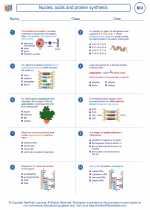
 Worksheet/Answer key
Worksheet/Answer key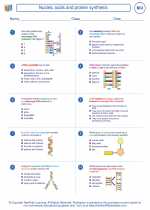
 Worksheet/Answer key
Worksheet/Answer key
 Worksheet/Answer key
Worksheet/Answer key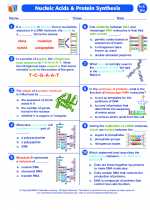
 Vocabulary/Answer key
Vocabulary/Answer key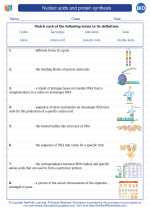
 Vocabulary/Answer key
Vocabulary/Answer key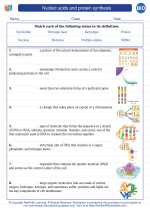
 Vocabulary/Answer key
Vocabulary/Answer key
